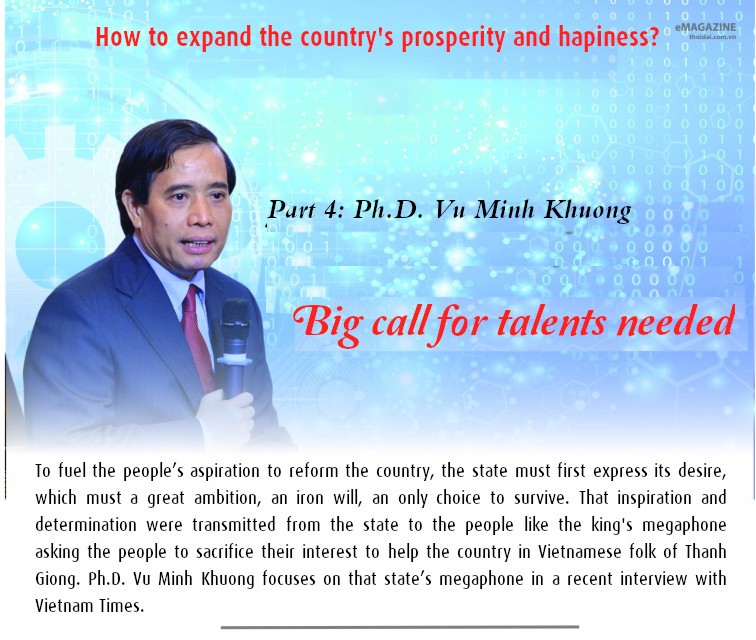 |
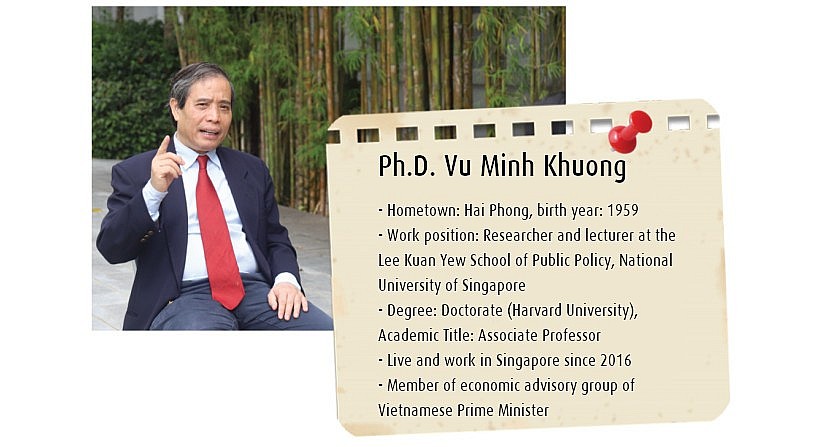 |
| Vietnam is determined to develop into a prosperous and happy country, then what kind of future does our country expect? A society is considered prosperous when it meets the following closely related criteria. The first is a high living standard and labor productivity, which means people have the ability and conditions to create values worthy of what they are entitled to. The first criteria would be achieved by the development of knowledge, skills, and incentives, from the infrastructure to the superstructure. The second is a good quality of life, which includes a clean environment, convenient housing, rich culture and entertainment, high quality of education. The third is the people’s confidence in themselves and faith in the future. In such a society, people no longer have fear due to invisible mental bondages and worry about life's uncertainties. They would feel a real freedom in creative work. In short, it can be understood that prosperity is a society that is rich in material resources, strong in a creative capacity, and confident in its ability to maintain and create prosperity in the future. Happiness is a rather independent concept from prosperity, especially in the difficult development journey of a nation. It is rooted in the hope for the future and the awareness of the mission, the trust in the community and institutional foundations, and a sense of development dynamics. A nation may have not earned prosperity yet but must be happy as generations are striving for national prosperity. In this regard, we need to create basic, democratic, and humane conditions, so that each person finds his life meaningful for the community and for himself to the extent that, if he could choose again, he would still pick his current life and lifestyle. That means people are doing what they aspire to, originating from the heart, not simply for the sake of survival. A society, even when it is not yet rich, can still be happy if its people trust each other, believe in justice and governance. |
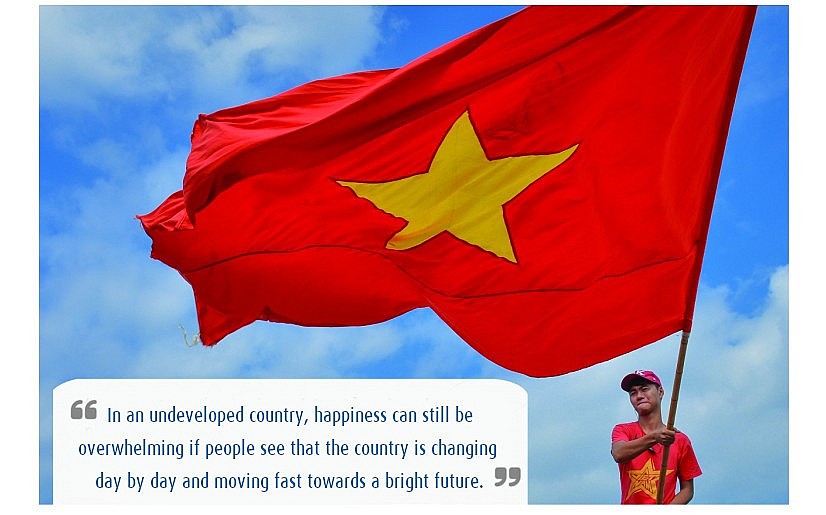 |
| What are the basic elements needed to construct a prosperous and happy society? In my opinion, there are 4 major groups of elements, including markets, institutions, human capabilities, and culture. The free market operates to stimulate creativity in learning, research production, and business. It motivates people to work hard. A society needs institutions to support and protect the market and people to perform favorable yet correct activities, towards the common interests of society. Education and training provide people with knowledge, skills, and the ability to seize opportunities and create good results. Culture helps people to have a spirit and personality rooted in the difficult history of the nation. It elevates the quality of dedication, national aspirations, efforts to unite the community, and love for fellow citizens. After years of research, I found out countries that earn prosperity and happiness from poverty all had leaders who devote to the nation's fate and understand that the responsibility of driving the country forward is historic, grand and harsh, which cannot tolerate selfish, lowly, and narrow-minded thoughts. Considering the above criteria and content, what can we be confident about and what needs to be improved? In the criteria of market and human capability, we have made positive progress. Institution has also been considerably reformed but we have not made great progress that matches the nation's expectations. Regarding culture, we still have weaknesses, especially in terms of community trust and solidarity. The four criteria mentioned above are like the four wheels of a chariot. All need to be strongly upgrade and operate synchronously to quickly move our country forward. What does Vietnam need to pursue prosperity and happiness? A great reform requires three key driving forces. The first is national sentiment and will, which is a source of courage to help a nation make brave and extraordinary decisions and an inexhaustible source of energy to help the nation move forward tirelessly in the challenging journey ahead. Vietnam has great strength, if not unparalleled, resources of this kind. However, that resource can only become a driving force when the whole nation shares a burning desire, which used to be for independence and freedom, now for prosperity and happiness. The second force is awareness and enlightenment, which is associated with the ability to deeply perceive the development law and the trend of the times. It helps leaders have foresight, big aspirations, deep and broad thoughts to build overall philosophies and strategies and at the same time cover the contexts, variables, and relations between factors in the process of development. The third is the ability to construct, which is shown through scientific institutional designs and highly effective strategic initiatives. This driving force helps a nation that has strength in the above two forces go very fast and far, creating development miracles that stun the world. In my point of view, after over three decades of reform, Vietnam has made great progress in enlightenment and many important advances in construction. However, these two are only at average level and have not reached the explosive stage, which is required to create a quantum leap. It is also worth noting that if these two are not strongly raised, they will hamper the force of national sentiment, which is Vietnam’s biggest strength. If that condition happens, no matter how strong enlightenment and construction forces grow, they are easy to get stuck in strategic blind spots, turn advantages into difficulties, turn opportunities into challenges, and the nation will blame failures on objective factors. At that time, both the national economy and businesses will be severely injured while their resilience will be weaker after each crisis. So we have great potential, but there is still a lot of work to be done to explore, promote and identify those potentials and overcome weaknesses. If you must choose only one issue as the key factor, what would it be? All strength, whether to promote potential or to correct oneself for perfection, lies in the people and nation. When that power is awakened, the social community can take on its mission and solve its tasks. To do so, that mission must be identified, named. Most importantly, there must be a special life force blown into the nation to wake, urge and light up the country's spirit. Leaders need to make brave decisions that convey messages aspiring appreciation and historic impulses. It urges the whole nation to “unite as one” to dedicate themselves to writing a heroic new page in the nation's history that will still be a pride thousands of years later. To accomplish miracle development in three decades to come, we need to turn our aspiration to build a great country by 2045 to mark the 100th anniversary of independence into a driving force for national emergence. If that emergence can be achieved, Vietnam will write in the history of mankind a legend that few nations could create, which is, within exactly 100 years, from 1945 to 2045, a short period compared to the country’s long history, the Vietnamese people have experienced all three tragic and dramatic forms of survival and development, including “Stand up”, “Wake up”, and “Emergence” – with extraordinary sacrifices and efforts to reach the lofty goal that generations yearn for. The “Stand up” period (1945-1975) was marked with historical milestones such as the Dien Bien Phu victory and the Ho Chi Minh campaign. The biggest driving force of this period was the national sentiment. The “Wake up” period with its Doi Moi (Renovation) launched in 1986 brought the country out of the constraints of dogmatic thinking to grasp the development laws and trends at that time. Vietnam achieved impressive success in that period, which was based on initial efforts to build and promote the two forces of enlightenment" and construction. Those achievements have played a fundamental role in the next stage of "Emergence" The emergence period, which we can foresee to take place heroic and powerful in the next 20-25 years, starts with terrible difficulties - the Covid-19 pandemic which is posing terrible consequences that no one could have imagined beforehand. However, the pandemic offers a big turning point, requiring the whole nation to dedicate itself to the cause of change. Change is stronger and more profound than renovation because it exploits to the fullest all three fundamental driving forces of development: Sentiment, Enlightenment, and Construction. Entering this era, we must transform national aspirations into policy decisions and institutional reforms that amaze the world with our vision and courage, intellectual brilliance, and extraordinary ability to coordinate in policy implementation. Indeed, we have currently opened the door to the biggest obstacles in the development journey and are having enormous potentials and opportunities to drive the country to the forefront in the flow of the times and achieve new development milestones in the 21st century. What should we do after opening that door? As I mentioned, we need to maximize all three core driving forces of development - national sentiment, enlightenment, and construction. We can refer to Japan’s Meiji-era. Emperor Meiji made five oaths in 1868 as the foundation for Japan's astonishing emergence, including (1) All residents are encouraged to participate in policymaking; (2) Each person is responsible for the cause of national development; (3) Everyone has the opportunity to pursue their ambitions and aspirations; (iv) Old customs are determined to be changed to suit objective laws; and (v) Worldwide elite knowledge is sought to build the country. It is noteworthy that of among Emperor Meiji’s five strategic directions, three focus on national sentiment and the latter two on enlightenment. It was these strategic reform directions that created a solid foundation for the Meiji reformers to make breakthrough constructive decisions, helping the Japanese people not only avoid the miserable slavery that many Asian nations fell into in the 19th century but also quickly become a leading power. |
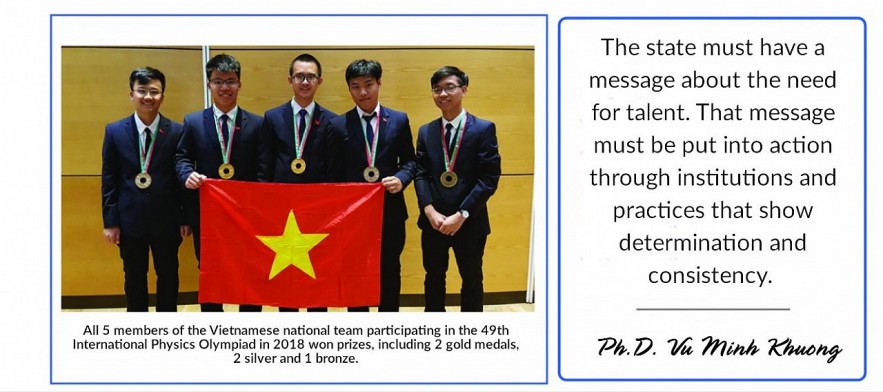 |
| What do you think about our talent issue? In my perspective, there are two big questions: how to find talents and how to promote talents. To answer the first question, the state must have a message about the need for talent. That message must be put into action through institutions and practices that show determination and consistency. The answer to the second question is that the institution must create favorable environment to educate talented people and conditions for them to devote. In the folk of Thanh Giong, when the country was invaded, the king sent messages through loudspeakers, calling people to help the country. The king’s court then chose a child who could not speak and walk to hand over the responsibility. The folk delivers a message that nothing but talent and enthusiasm should be taken into account. A talent does not need to be a king, nobleman, to have achievement or reputation. We could take the Vietnam National Football Team as an example. When we dare to hire coach Park Hang Seo regardless of planning requirements such as seniority or ranking but only care for his ability, we gain high achievements. We create a transparent, scientific and most importantly an encouraging environment. At the same time, the institution must link its roles and positions with responsibilities in a transparent manner, giving talents an environment in which they can fully devote. Many of our staff have talents, but when they start to receive high positions, they focus on taking care of their family and themselves. Therefore, they will achieve limited results and more importantly, they will not create sentiment for colleagues and subordinates. They have not yet become an example for their colleagues and society, so the leaders’ spillover effect is not high. Due to the current appointment and evaluation mechanism, a leader’s top priority is to keeping his position, getting promoted, or gathering assets, rather than leaving legacies for the next generations. In leadership, a talent must know how to organize a regime that always produces talented people best suited to the task and the times. The environment for talented and virtuous people is an institution in which the weak can rest assured, the bad cannot harm society. Employment is the message of the institution, which is an important factor in creating trust for society and partners. As I mentioned above, trust in society is an element to build a culture - one of the four pillars to construct a prosperous society. |
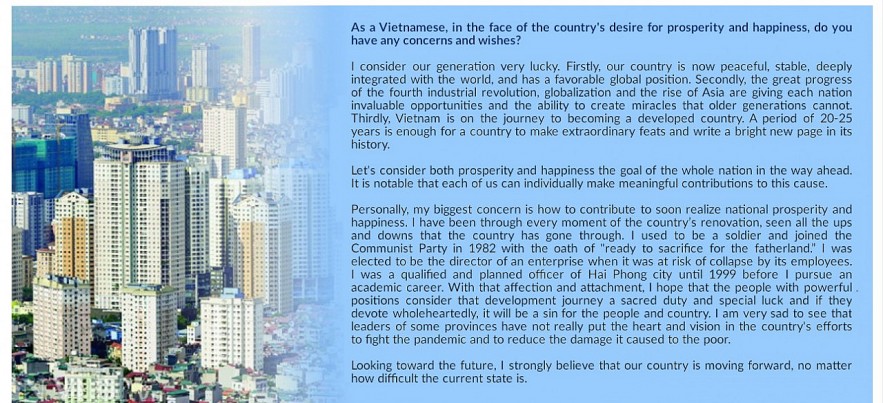 |
| In your opinion, how can Vietnam have the courage to spark the desire to develop a prosperous and happy country? It takes many elements to create such an aura. But first, we have to answer a question: “Do the country leaders have big enough aspirations and determination for this issue?” In Thanh Giong folktale, when enemies invaded the country when the nation was put in danger, the king use megaphones to call for people’s support. When the king’s court had real aspirations, the people donated their assets for the heroic Thanh Giong. When the Tran Dynasty faced Mongol soldiers, Hich Tuong Si (Exhortation to the Military Generals) and Dien Hong Summit were born. That source of inspiration, that flag is the beginning of the whole nation’s transformation. Only then can there be miracles. I look forward to hearing the "Please help the country!" call from the leaders echo so that this aspiration is to awaken and be realized. |
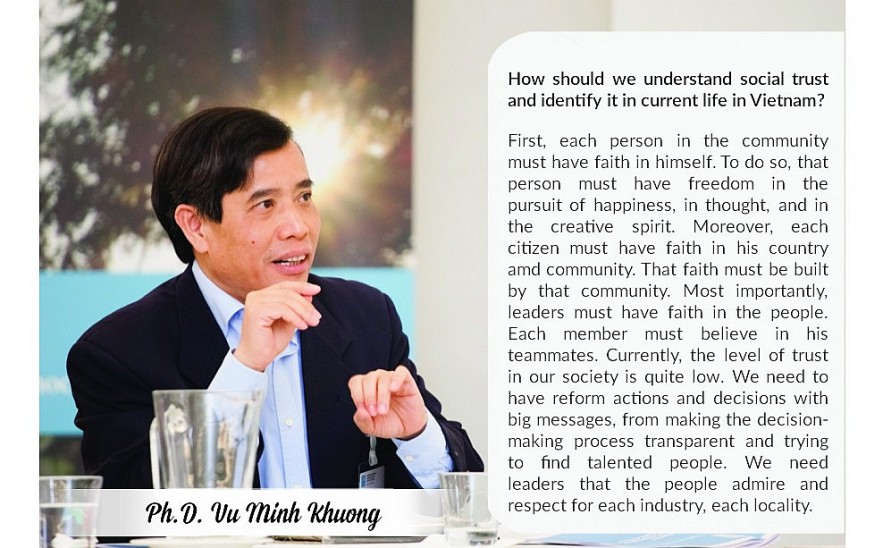 |
| Vietnamese version: Cần tiếng loa vang vọng gọi nhân tài Content: Tram Anh Graphic design: Tao Dat - Binh An Text graphic: Hong Anh |
|